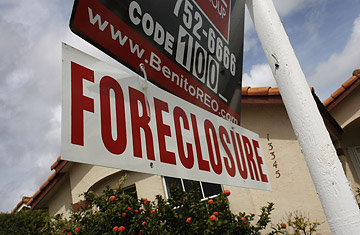
A house under foreclosure in Florida.
As vacant homes deteriorate and become eyesores throughout the country, cities are anxiously awaiting the arrival of federal funds — including a $4 billion housing stimulus jolt just signed by the President — to assist with the foreclosure crisis. The hope is that the federal injection of funds will help homeowners struggling to make mortgage payments. In South Florida, one of the worst hit areas of the country, the help can't come soon enough. And one local government is already off to a fast start in dealing with the wide variety of foreclosure hardships that make up the crisis.
Four months ago, the city of West Palm Beach opened its foreclosure assistance center, a one-stop shop where staffers assist besieged homeowners by calling lenders, renegotiating loans and arranging for short-sales — that is, the bank-approved sale of a house at a price below its outstanding mortgage. The center will even help cover late mortgage payments up to $10,000. Since April, the center has received more than 5,000 phone calls or visits for help; so far, 171 homes have been saved from foreclosure, and others have received various forms of help. The county is desperate. As of July, it had recorded 15,803 foreclosure proceedings for 2008 compared to 13,695 in all of 2007. Indeed, the need in the area is so great that a third of all requests for assistance come from outside West Palm Beach — and cannot qualify for assistance.
At the helm of the assistance center is Emelda Johnson, who spent four years as the deputy assistant secretary at the Housing and Urban Development Department in Washington, D.C. The city hired her in September, and, in a matter of months, she was crafting the plan for the foreclosure assistance center, an idea that she said has no precedent. Johnson contacted lenders, non-profits, mortgage entities, "anyone who touched the whole process of lending." But as the program was being formulated, many of those groups backed out. Still, partners came on board. At first, $1 million was cobbled together from a developer-contribution trust fund and other available grant money. Another $430,000 became available in HUD money. "For government, if you can do something in less than two years, it's a miracle," says West Palm Beach Mayor Lois Frankel.
Johnson and Frankel are waiting for more money from the stimulus bill package to trickle down, though Johnson fears bureaucratic delays. That means many of the people who need help won't get it through this bill, says Brad Hunter, director of the South Florida market of MetroStudy, a housing market research firm. The confusing, work-in-progress package, for example, is supposed to help first-time homeowners but won't help those who have already lost their homes.
The housing stimulus funds may not be enough to deal with what Hunter says are more troubles set to crash on the market next year. That is when soaring interest rates are triggered, affecting borrowers in real estate hot spots-turned-problem areas such as Florida and California who signed up for negative amortization loans. A clause in many of those loans calls for them to be reset if the home's value drops a certain percentage below the loan's amount. "There quite easily could be a doubling of a monthly payment," he says.
Meanwhile, inventory continues to stockpile in Florida, creating a vicious cycle. Months pass as homes are foreclosed on, banks can't sell them, home prices stay low, and that sets off even more foreclosures. A report released earlier this month showed that it takes longer to sell a house in the south Florida market than in any other metropolitan area in the country.
Michael and Ingrid Webb are among the hundreds of people who sought help in West Palm Beach after they missed two months of mortgage payments. They owed thousands to their lender, which refused to refinance. Michael had expected to pay a $1,600 monthly mortgage when they first refinanced a year ago, but unexpectedly wound up paying more than $2,400 because of a higher interest rate. Savings and 401(k) accounts were depleted. They first learned about the foreclosure assistance center on their city water bill. They now pay about $200 less a month in their mortgage thanks to its refinancing help.
"At the time we were in a bind. Financially, we just couldn't see ourselves making the monthly payment and paying all our bills. They really saved the day for us," Michael Webb says. One of his daughters even received an eviction notice from her apartment on the University of Central Florida campus because her parents couldn't help. Still, one travail has followed another as the economy declines. Just last week, Michael Webb lost his job as an executive chef. He and his wife have a plan to start a catering business, and Webb thinks things will turn around. He is grateful for at least one thing. "Without [the foreclosure assistance center], we wouldn't have made it this far," he says.
